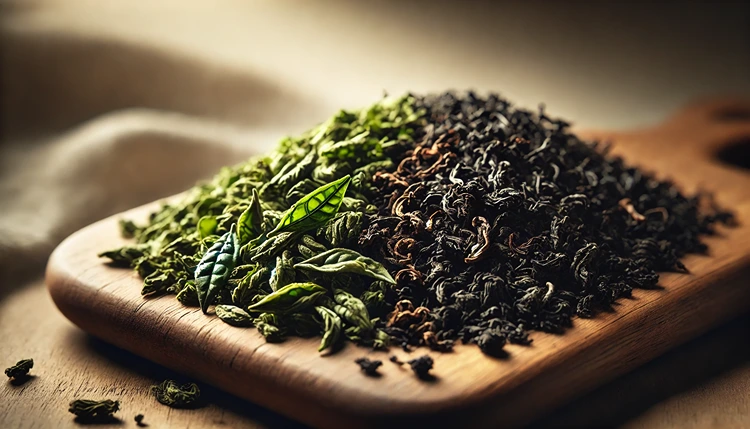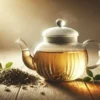If you’re on the lookout for natural ways to support your weight loss journey, you’re likely familiar with tea as a helpful option. But when it comes to choosing between oolong tea and black tea, which one packs a better punch for shedding those extra pounds? Both teas have unique properties that could boost your metabolism and support your goals, but which is the best fit for you?
In this post, we’ll break down the differences between oolong tea and black tea, focusing on how they impact weight loss. By the end, you’ll have a clearer understanding of which tea might be more effective in helping you reach your goals.
What Is Oolong Tea?
Oolong tea is often considered a middle ground between green and black tea. It undergoes partial oxidation, giving it a flavor profile that combines the best of both worlds—light and floral like green tea, but with the boldness of black tea. Its unique processing method also makes it rich in antioxidants, which are known to promote various health benefits, including weight loss.
Helpful Hint:
If you’re new to oolong tea, start by brewing it at around 185°F (85°C) for 3-5 minutes. This temperature helps preserve its delicate flavors while still extracting the beneficial compounds that may aid in weight loss.
What Is Black Tea?
Black tea is fully oxidized, giving it a darker color and a stronger flavor than oolong tea. It’s a staple in many households and is enjoyed both plain and with milk. Black tea is rich in theaflavins and thearubigins, two types of antioxidants that are thought to help with fat metabolism and overall health. Its robust nature makes it an easy addition to your daily routine, especially if you’re looking for a tea that provides a solid caffeine boost along with potential weight loss benefits.
Which Tea Burns More Fat: Oolong or Black?
So, which tea actually helps burn more fat? The answer depends on how these teas work with your body. Oolong tea is known for its ability to increase fat oxidation—meaning it helps your body use fat for energy. Studies suggest that regular consumption of oolong tea may increase calorie burning by 3-4%, which can add up over time. Black tea, on the other hand, helps improve fat metabolism by promoting the growth of good bacteria in your gut, which can indirectly support weight loss efforts.
Both teas offer unique fat-burning benefits, but oolong tea may have a slight edge when it comes to boosting your body’s ability to burn fat directly.
How Caffeine Plays a Role in Weight Loss
Both oolong tea and black tea contain caffeine, but in varying amounts. Caffeine is a well-known metabolism booster, and consuming it in moderate amounts can increase your body’s ability to burn calories. On average, oolong tea contains less caffeine than black tea, making it a great choice for those who are caffeine-sensitive but still want to enjoy the metabolism-boosting benefits of tea.
- Oolong Tea: 30-50 mg of caffeine per cup
- Black Tea: 40-70 mg of caffeine per cup
While both teas can enhance your metabolism, black tea’s higher caffeine content could give you a more significant energy boost, which might help you push through your workouts more effectively. However, if you’re looking for a milder option that won’t leave you feeling jittery, oolong tea is likely the better choice.
Comparison of Oolong Tea and Black Tea for Weight Loss
| Aspect | Oolong Tea | Black Tea |
|---|---|---|
| Caffeine Content (per cup) | 30-50 mg | 40-70 mg |
| Fat Oxidation | Increases fat oxidation significantly | Supports fat metabolism through gut health |
| Antioxidant Content | High in polyphenols, catechins | High in theaflavins and thearubigins |
| Best Time to Drink | Morning or early afternoon | Morning (avoid late afternoon or evening) |
| Flavor Profile | Light, floral, and slightly sweet | Bold, malty, and robust |
| Gut Health Benefits | Moderate | Significant impact on gut bacteria |
| Thermogenic Properties | Boosts calorie burning by 3-4% | Supports overall fat burning |
How Oolong Tea Helps With Weight Loss
Oolong tea’s main contribution to weight loss is through its thermogenic properties, meaning it increases your body’s heat production. This boost in heat helps you burn more calories even while at rest. In addition to this, oolong tea has been shown to reduce fat absorption, meaning your body absorbs less fat from the food you eat, which can prevent weight gain over time.
How Black Tea Helps With Weight Loss
Black tea supports weight loss by altering your gut microbiome in a way that promotes the growth of beneficial bacteria. This leads to improved digestion and fat metabolism. In addition, black tea’s high antioxidant content helps combat oxidative stress, which can slow down weight loss efforts if left unchecked. Studies suggest that drinking black tea regularly can help reduce visceral fat, which is the harmful fat stored around your organs.
Does Drinking Tea Alone Help You Lose Weight?
It’s important to note that while oolong and black tea have weight-loss-promoting properties, they are not magic solutions. Drinking tea alone will not result in significant weight loss unless it’s paired with a healthy diet and exercise. However, both teas can support your efforts by enhancing fat metabolism and improving overall health, making it easier to achieve your weight loss goals.
Think of tea as a tool to complement a balanced lifestyle, rather than the sole method for weight loss.
How Often Should You Drink Oolong or Black Tea for Weight Loss?
When it comes to weight loss, consistency is key. Both oolong and black tea offer benefits when consumed regularly, but how often should you drink them to see results? Research suggests that drinking about 2-3 cups of oolong or black tea per day can provide enough of the necessary compounds to support weight loss efforts. These teas can help boost your metabolism throughout the day, and if paired with healthy eating and physical activity, they can give you a noticeable edge.
However, keep in mind that while these teas can support weight loss, drinking excessive amounts may lead to unwanted side effects due to their caffeine content. It’s important to balance tea consumption with other aspects of your diet and exercise routine.
Helpful Hint:
To maximize the weight loss benefits of oolong or black tea, drink a cup before your workout. The caffeine and other compounds can help increase fat oxidation and boost your energy levels, helping you burn more calories during exercise.
What’s the Best Time of Day to Drink Tea for Weight Loss?
The time of day when you drink tea can influence its effectiveness in supporting weight loss. Here are some recommendations for both oolong and black tea:
- Oolong Tea: Oolong is ideal in the morning or early afternoon. Its moderate caffeine content provides a gentle energy boost without being too overwhelming. Drinking it with or after meals can help reduce fat absorption and regulate blood sugar levels.
- Black Tea: Since black tea contains more caffeine, it’s best to consume it in the morning to kickstart your metabolism. Drinking black tea in the afternoon might keep you awake at night, so it’s better to enjoy it earlier in the day to avoid disrupting your sleep.
Drinking tea at consistent times each day, such as with breakfast or before a workout, can help integrate it into your routine, ensuring that you reap its weight loss benefits over time.
Can You Combine Oolong and Black Tea for Weight Loss?
Yes, combining oolong and black tea in your routine can provide a well-rounded approach to weight loss. Since both teas offer different benefits, alternating between them can give you the advantages of both without overloading on one type. For example, you might drink oolong tea in the afternoon for a lighter, metabolism-boosting beverage and black tea in the morning to get a stronger caffeine boost and promote fat metabolism throughout the day.
This variety can also keep your tea routine interesting and flavorful, making it easier to stay consistent.
What Are the Side Effects of Drinking Too Much Tea?
While oolong and black tea can support your weight loss goals, it’s essential to be aware of potential side effects if you drink too much. Both teas contain caffeine, which, in excess, can lead to unwanted effects such as:
- Insomnia or disrupted sleep
- Increased heart rate
- Anxiety or jitters
- Digestive issues, such as acid reflux
To avoid these side effects, it’s best to limit your tea consumption to 2-3 cups per day, especially if you’re sensitive to caffeine. You can also consider switching to decaffeinated versions in the evening to enjoy the health benefits without the caffeine hit.
How Does Tea Support Long-Term Weight Loss?
Drinking oolong or black tea for weight loss isn’t a quick fix, but over time, their consistent consumption can lead to lasting results. These teas help regulate your metabolism, improve digestion, and support fat oxidation—all of which contribute to long-term weight management when paired with a healthy diet and active lifestyle.
Tea’s role in weight loss is all about sustainability. Instead of focusing on rapid results, think of it as a gradual, supportive tool that works with other healthy habits to help you achieve and maintain your goals.
Should You Add Sweeteners to Oolong or Black Tea?
If your goal is weight loss, it’s best to avoid adding sugar or other sweeteners to your tea. Even natural sweeteners like honey or agave can add unnecessary calories, which can counteract the benefits of drinking tea for weight loss. Instead, try these alternatives:
- Add a slice of lemon for a fresh, tangy flavor
- Use a dash of cinnamon or ginger for added spice
- Try a splash of unsweetened almond milk for a creamy texture without extra sugar
Keeping your tea simple and free of added sugars ensures that you’re not sabotaging your weight loss efforts with hidden calories.
Pros and Cons of Drinking Oolong and Black Tea for Weight Loss
Pros
- Both teas help boost metabolism and fat oxidation.
- They are rich in antioxidants, supporting overall health.
- Oolong tea offers a milder caffeine option for those sensitive to caffeine.
- Black tea can provide an energy boost due to its higher caffeine content.
- Both teas are easy to incorporate into your daily routine.
Cons
- Excessive consumption of either tea may cause digestive issues or caffeine-related side effects.
- Black tea’s higher caffeine content can interfere with sleep if consumed too late in the day.
- Drinking tea alone won’t result in significant weight loss without proper diet and exercise.
- Some people may find oolong tea’s flavor too light or subtle.
- Adding sweeteners or milk can negate the weight loss benefits.
FAQs
Wrapping Up
When it comes to comparing oolong tea and black tea for weight loss, both offer impressive benefits. Oolong tea’s thermogenic properties and fat oxidation boost make it a gentle yet effective choice. Black tea, with its higher caffeine content, can give you an energy boost while supporting fat metabolism and gut health. Ultimately, the best tea for you depends on your personal preferences and tolerance for caffeine.








